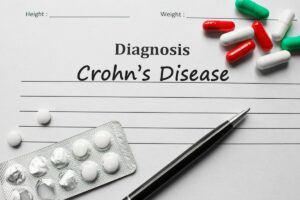Crohn’s disease and oral health

In this post, we’ll talk about the effects of Crohn’s disease on oral health and point out potential symptoms. Early detection of Crohn’s disease can often lead to more successful treatment, a healthier body in general and stronger oral health.
Likelihood of oral manifestations
In adults with Crohn’s, typically one-third can experience oral manifestations. However, children are even more likely to exhibit these signs. A study found that approximately 50 percent of pediatric patients displayed oral signs of the disease, often before any other symptom was present.
What to look for
Oral manifestations appear very much in the same way they do in the intestines. When finding a cobblestone appearance of the mucosa, deep linear ulcerations or mucosal tags, Crohn’s could be considered as a possible cause.
Management of Crohn’s disease
Treatments include pharmacotherapy, surgery and dietary changes but close to three-fourths of all patients suffering from Crohn’s may eventually need surgery.
Suggestions for oral care
Patients exhibiting mild oral manifestations can typically receive dental care and treatment without complication. Sores will generally heal on their own without any treatment or intervention. A small percentage of patients might suffer from recurrent ulcerations or large oral ulcers. Topical steroids have been shown to both alleviate pain and speed up healing while biologics will be needed to treat the most severe cases.
Keep an eye out for caries, periodontal disease and other oral complications typically caused by malnutrition. Crohn’s can lead to poor absorption of nutrients, which can then negatively effect oral health.
While all dental patients should be advised against the use of tobacco products, those with Crohn’s can experience prolonged flare-ups as tobacco interferes with the medications prescribed to treat the disease.
Make the referral
If you suspect a patient may have Crohn’s, refer them to a gastroenterologist. In severe cases, you may need to collaborate with the patient’s other physicians to chart the best course for strong oral health.






